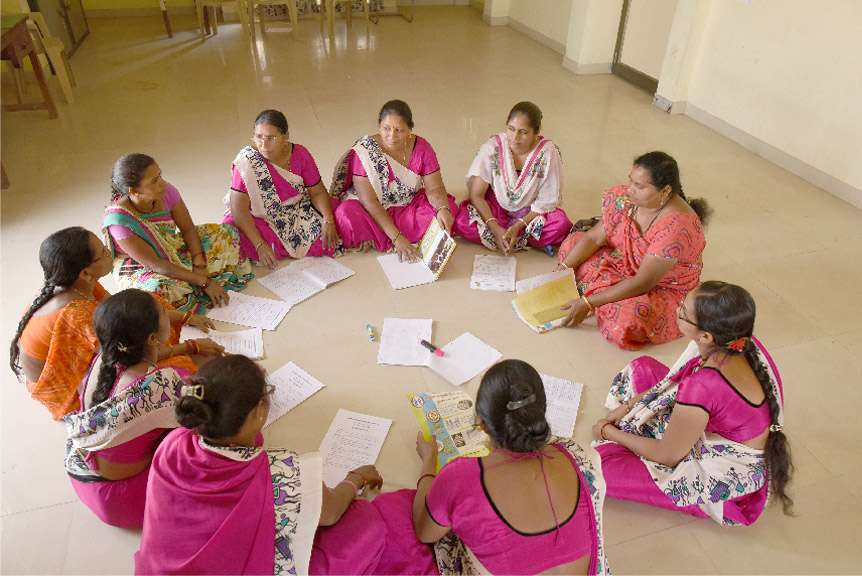Empowering Women through Livelihood
With women constituting half the population, their equal participation in society is imperative for sustainable development. Aatapi has prioritized financial inclusion of women to empower them to break societal, familial and self-imposed barriers that relegate them to an unequal status.

Access to micro finance through the formation of self-help groups has been catalytic in effecting ripples of change. 2800+ plus women from 25 villages are now members of self-help groups. The self-help groups were registered as the Ujaas Mahila Bachat Dhiran Grahak Sahakari Mandali, Ujaas in 2013. Given the opportunity to act independently, the women have shown their mettle, and their managerial skills. A strong leadership has emerged and has been nurtured by Aatapi – the women manage very regular, systematic savings and credit activity in their self-help groups. The committee of group leaders manages the operations of the Ujaas Sahkari Mandali.
Ujaas is the women’s platform, a space to express their needs, find solutions, share joys and sorrows and celebrate their successes. Their growing self-esteem and financial contribution have tilted the dynamics in their homes, community and village. Families, especially men realise the significant contribution of small savings in triggering larger transformations in their lives.
Aatapi engaged in a series of dialogues with women farmers and encouraged them to rearticulate their role in farming and animal husbandry to pave the path to empowerment. Access to credit through Ujaas via the Joint Liability Group Scheme offered by Nationalised Banks was a critical link between economic opportunities and positive outcomes. Money was utilised not only in enhancing agriculture practices and buying buffaloes to establish and expand their dairy activities but redemption of mortgaged land of families and annual land contracts for farming.
The women’s contribution to the family coffers grosses Rs 2.25 Crore between 2011 to March 2020. Access to micro-finance has benefited 1451 women (renewal loans counted).
Aatapi planned the strategic inclusion of women in meetings with agriculture experts, exposure trips to agriculture universities and other organisations. Their participation enhanced their knowledge and understanding of best farming practices. Seeds, fertilisers, compost, vermi-compost, pesticides, appropriate practices and innovations became vehicles for interactions between the women and their spouses. Their suggestions were heard and considered. Women of self-help groups were registered with Agriculture Technology Management Agency (ATMA), a central government unit for promotion of agriculture technology in rural areas. Aatapi’s inclusive approach created platforms for leadership training. These opportunities enabled men and women to redefine their identities. Woman leaders are now members of the Executive Committee of the Farmer Producer Organisation.
In the dairy sector, the women observed that with scientific knowledge and best practices, milk yields were increasing but returns were not growing significantly. 44 private dairies in 4 villages offering less than fair prices and the lackadaisical management of the cooperative dairies were responsible for the poor returns on effort and investment. Under immense social and political pressure the once docile women stood their ground and applied for their own women’s dairy. Thus, on 4th March 2014, emerged the first women’s dairy – The Kamboya Waga Mahila Dudh Utpadak Sahakari Mandli Ltd. The successful run of this dairy has catalysed the formation of three more cooperative dairies.
The journey of rephrasing and renegotiating spaces continues in a non-threatening way wherein empowered role models are catalysts for taking the message forward to more women as well as men farmers.
